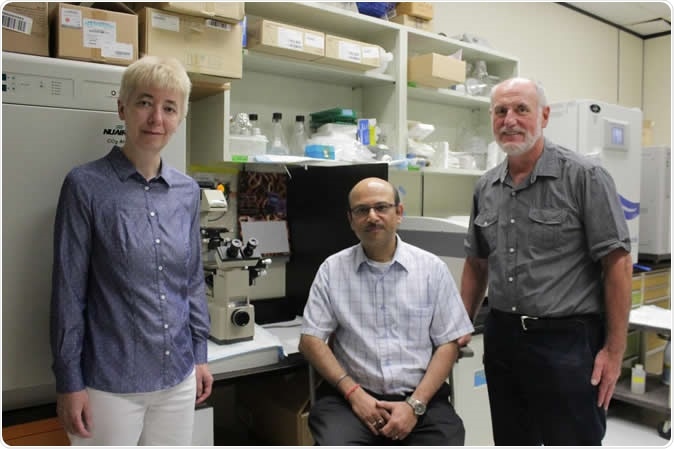Neglected tropical diseases form a group of infectious parasitic diseases that affect a large percentage of the world population, mostly in emerging nations. Sleeping sickness affects millions in sub-Saharan Africa and is caused by the protozoan parasite, Trypanosoma brucei, which is transmitted by the tsetse fly. If left untreated, sleeping sickness is fatal. Animal trypanosomiases caused by other members of the genus Trypanosoma place additional financial and social pressures on the nations of this region.
Current drugs used to treat sleeping sickness are restricted in their utility because of toxicity, severe side effects, and complicated administration. Moreover, neglected tropical diseases affect mostly those countries with the least financial or infrastructural resources to develop or deliver new therapies. Therefore, the identification of novel drug targets and the development of new drugs for these targets are pressing priorities.
In a new study by researchers at the University of Alberta Faculty of Medicine and Dentistry, they found a protein that could be the key in treating tropical diseases. The important protein in the cells of an infectious parasite may shed light on the disease pathology, and in time, open the door to less harmful treatments for millions of people.

(From left) Researchers Barbara Knoblach, Hiren Banerjee and Rick Rachubinski are now using their discovery to identify new, less toxic drugs to treat neglected tropical diseases that affect millions in Africa and South America. Image Credit: Ryan O'Byrne
Protein that exists in parasites is key for viability
A special protein, PEX3, is long believed not to exist in the parasite, trypanosome, which can be transmitted through insect bites. But, the researchers of the study published in Life Science Alliance, found that the protein is present in the parasite and is crucial for its viability.
PEX3 is an important component of the cell biology of living things, including plants, humans, and trypanosome. It works by regulating peroxisomes that help in the break down of amino acids and fatty acids to create energy.
In trypanosomes, they contain special peroxisomes that are important in one process – converting glucose in a host’s body into energy. Hence, if therapeutics target PEX3, it could help in killing the parasite, without hurting or harming the host.
PEX3 is vital for formulating new treatments
In light of the discovery, targeting PEX3 could be the key to finding the cure for various parasitic diseases like Chagas disease, African sleeping sickness, and leishmaniasis, which all threaten millions of people worldwide.
"Finding PEX3 in trypanosomes has been very difficult. People have been looking for years and could not find it," Rick Rachubinski, a member of the U of A's Women and Children's Health Research Institute, said in a statement.
"Some people said it didn't exist, that it was a different mechanism, but we believed that the simplest answer was that we just hadn't found it yet,” he added.
At present, the team is in the process of determining a drug treatment that could help cure tropical diseases caused by trypanosomes. They have determined a key protein that can be targeted to prevent the parasites from making enough energy to survive in the host’s body.
Current treatments for these diseases may become toxic to hosts. Hence, the discovery can help reduce the side effects. The search for treatments and therapies for neglected tropical diseases is a lifelong goal of one of the researchers, Rachubinski.
“This one, to me, has been rewarding because it’s been a constant theme throughout my career,” Rachubinski said.
“This is a worldwide problem, and I’ve always believed that affluent nations like ours should help emerging nations that don't have the resources to deal with burdens like neglected tropical diseases,” he added.
Trypanosomes in a view
Trypanosomes are unicellular parasitic protozoa from the Genus of the Trypanosomatidae Class. They are rampant in tropical areas, including the African continent. It is well-known as the causative agent of various human and animal diseases.
For instance, trypanosomes cause sleeping sickness, which first emerged in Africa. It is now endemic in 36 sub-Saharan Africa countries, where the tsetse flies transmit the illness. The diagnosis and treatment are complex and skilled staff, or health care providers are the only ones who can give the treatment.
Journal reference:
Banerjee, H., Knoblack, B., and Rachubinski, R. (2019). The early-acting glycosome biogenic protein Pex3 is essential for trypanosome viability. Life Science Alliance. https://www.life-science-alliance.org/content/2/4/e201900421